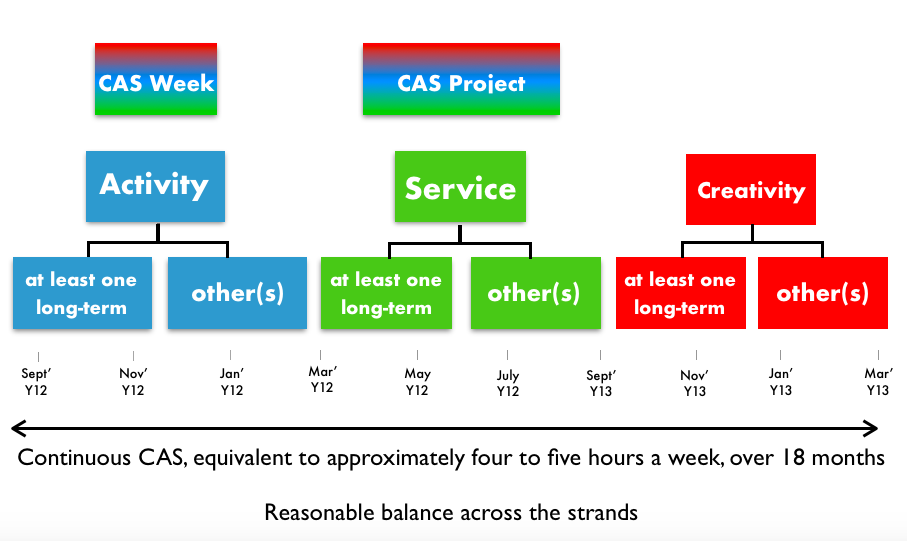PROGRAMME REQUIREMENTS
Students engage in CAS experiences involving one or more of the three CAS strands. A CAS experience can be a single event or may be an extended series of events.
Short term experiences are one-off events or are usually of short duration. They generally do not involve committing a lot of time or effort in planning the event/activity and may only achieve one/two of the CAS learning outcomes. But they can be great for trying something out! No CAS experience should be trivial and students should be considering activities that require a time commitment of at least 5 hours as a rough guide - although keep in mind – we are not counting hours!
Examples include: Delivering care packages to homeless people, taking part in a dance competition, running a stall at the school fair, beach cleanups, helping a charity organisation paint an art mural, taking part in Famine 24 or participating in a drama workshop leading to an original performance and not required for DP subjects.
A long term commitment, or extended series of events, is expected to last for a term, the duration of the school year or longer and certainly more than a month with weekly or regular participation. It should show a significant level of personal involvement, initiative and commitment and is likely to allow you to fulfil several of the CAS learning outcomes.
Examples include: student leadership positions like House Captain, music, art or dance lessons leading to the creation of an original product/performance, being part of a Black Kites sport team, HKAYP or working for the school’s Red Door team.
Further, students undertake a CAS Projects of at least one month’s duration that challenges students to show initiative, demonstrate perseverance, and develop skills such as collaboration, problem-solving, and decision-making. The CAS project can address any single strand of CAS, or combine two or all three strands. Students are required to collectively write a CAS Project Proposal with their project group and submit this to the CAS Coordinator, who will invite them to a project approval meeting. Projects should be approved by the CAS Coordinator before they begin.
All students take part in CAS Week during Year 12. This is an opportunity to try something new and challenging in a concentrated period and may involve a longer term commitment outside of the week in preparing for and resulting from the week’s experience. As such, events leading up to CAS week can be considered as a long term or short term commitment depending on the activity and the level of commitment that was required to see the activity through.
Students at Renaissance College participate in CAS Week experiences both locally and internationally and we endeavour to sustain long-term ethical partnerships with placement providers.

Our minimum CAS requirement for each RCHK student is as follows:
• at least one long term commitment in each strand of Creativity, Activity and Service• regular weekly involvement in ‘something’ CAS for at least 18 months of the diploma
• at least one CAS project demonstrating use of the CAS stages
• participation in CAS week
• genuine achievement of the 7 learning outcomes at least twice
• a reasonable balance of experiences across the three strands
• reflections that demonstrate self-awareness, recorded regularly
• regularly maintain a CAS portfolio that evidences achievement of the outcomes
Every student’s CAS programme is unique and not all experiences will easily classify as short term or long term or involve only one strand. The key to a student’s CAS programme is personal engagement, choice and enjoyment through a range of experiences, a balance between the strands and providing a challenge for the individual. As such, it is important that students discuss their CAS plans with their Advisor and ask any questions that they might have.
All students are expected to maintain and complete a CAS portfolio on ManageBac as evidence of their engagement with CAS. The CAS portfolio is a collection of evidence that showcases CAS experiences and for student reflections.
Completion of CAS is based on student achievement of the seven CAS learning outcomes. Through their CAS portfolio, students provide the school with evidence demonstrating achievement of each learning outcome.